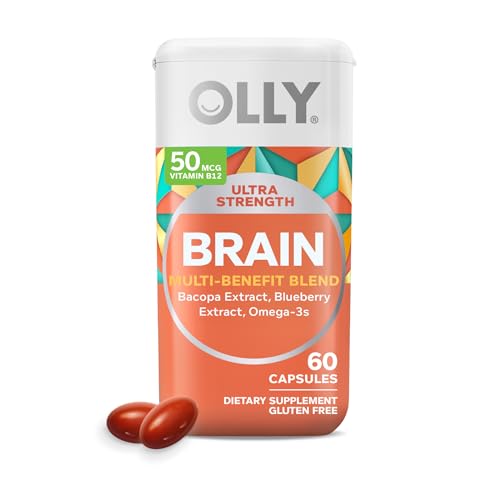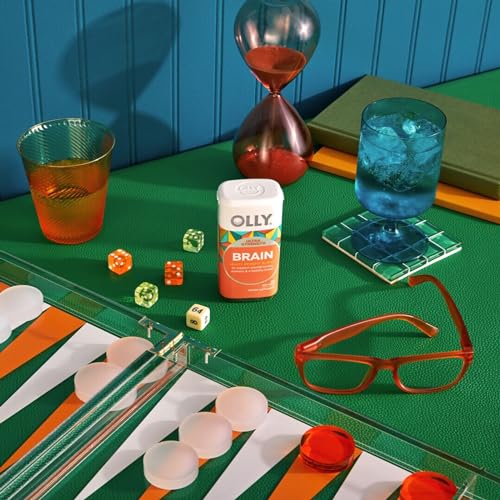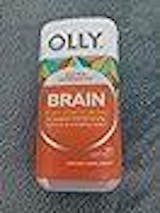

OLLY Ultra Strength Brain Softgels - Supports Memory & Focus with Omega-3s, B6, B12 - 60 Count


Titanium Dioxide
Medium RiskTitanium dioxide is an inorganic compound used primarily as a pigment due to its brightness and high refractive index. It is commonly found in products such as paints, coatings, plastics, and cosmetics, providing color and opacity.
Sustai Insights
Titanium dioxide serves effectively as a UV filter and colorant, enhancing product stability and performance. However, it has been classified as a moderate concern for potential carcinogenicity and carries low risks for allergies and reproductive toxicity. Environmental risks include its pollutant potential, though it is not known to bioaccumulate. Regulatory bodies have issued specific restrictions regarding its use, leading to an overall medium risk assessment. Safe usage practices should be observed, with consideration for alternatives such as zinc oxide for a more sustainable option.
Lecithin
Medium RiskLecithin is a naturally occurring lipid found in various plant and animal tissues, primarily composed of phospholipids. It serves as an emulsifier, stabilizing mixtures of oil and water, and is commonly used in food, cosmetics, and pharmaceuticals to improve texture and extend shelf life.
Sustai Insights
Lecithin provides functional benefits as an effective emulsifier and stabilizer, enhancing product texture while being sustainably sourced from natural origins. Health risks are generally low, with moderate concerns regarding allergies and immunotoxicity but minimal cancer or reproductive toxicity risks. Environmental hazards are limited, and it is not classified as a pollutant. Regulatory bodies impose few restrictions. Overall, lecithin presents a medium risk, suggesting caution in usage, especially for sensitive individuals. Alternatives include sunflower lecithin or other plant-based emulsifiers that may offer similar benefits with reduced allergenic potential.
Maltodextrin
Low RiskMaltodextrin is a saccharide material obtained from starch through partial hydrolysis. It is commonly used as a thickener, filler, or preservative in food and cosmetic products due to its ability to enhance texture and stability.
Sustai Insights
Maltodextrin serves as an effective thickener and stabilizer in various products, and it is typically derived from renewable sources. Health risks are minimal, as it poses low concerns for carcinogenicity, allergies, and developmental toxicity. Environmental impacts are also low, with no significant pollutant or bioaccumulation potential. Regulatory bodies do not impose major restrictions on its use. Overall, maltodextrin presents a low-risk profile, making it a widely accepted ingredient in food and cosmetic formulations.
Water
Low RiskWater is a clear, colorless liquid essential for various biological processes. It serves as a solvent in formulations, facilitating the dissolution of other ingredients and enhancing product texture and application. Additionally, water plays a crucial role in hydration and is a key component in many cosmetic and personal care products.
Sustai Insights
Water is an effective solvent and hydrator, contributing to the texture and efficacy of formulations. It is biodegradable and generally regarded as safe, with low concerns regarding carcinogenicity, allergies, and reproductive toxicity. However, excessive water usage can lead to environmental concerns, particularly regarding resource depletion. Regulatory bodies do not impose restrictions on water use in cosmetics. Overall, the risks associated with water are low, making it a safe and essential ingredient.
Beeswax, Yellow
Low RiskBeeswax, yellow, is a natural wax produced by honeybees, primarily composed of esters of fatty acids and long-chain alcohols. It serves as an emulsifier, thickener, and stabilizer in cosmetic formulations, contributing to texture and consistency. It is commonly used in creams, balms, and lip products.
Sustai Insights
Beeswax provides functional benefits such as enhancing product texture and acting as a natural emulsifier, while also being biodegradable and sustainably sourced. Health risks are minimal, with low concerns for carcinogenicity, allergies, or irritations. Environmental impacts are also low, as it does not bioaccumulate. Regulatory status remains favorable with no current restrictions. Overall, the ingredient poses low risk, making it a suitable choice in cosmetic formulations.
Vegetarian Glycerin
Low RiskVegetarian glycerin, also known as glycerol, is a colorless, odorless, and viscous liquid derived from plant sources. It is primarily used as a humectant, solvent, and emollient in various personal care products, helping to retain moisture and improve texture.
Sustai Insights
Vegetarian glycerin offers functional benefits as an effective humectant, promoting hydration and skin smoothness. It is biodegradable and typically sustainably sourced. Health risks associated with glycerin are low, with no significant concerns for carcinogenicity, allergens, or reproductive toxicity. Environmental risks are minimal, and it is not subject to major regulatory warnings. Overall, the risk level for this ingredient is low, making it a safe choice in formulations. Safe usage practices include ensuring proper concentrations in products, and alternatives such as propylene glycol exist but may have differing properties.
Oryza Sativa (Rice) Oil
Low RiskOryza sativa (rice) oil is a refined oil derived from the grains of the rice plant. It is commonly used in cosmetic and personal care products for its emollient properties, helping to moisturize and soften the skin. Additionally, rice oil can serve as a carrier oil for other ingredients.
Sustai Insights
Oryza sativa (rice) oil offers functional benefits as a moisturizer and emollient, contributing to skin softness. It is considered low risk regarding carcinogenicity, allergies, and reproductive toxicity, with contamination concerns being a notable issue. Environmentally, it poses minimal pollution risk and is not bioaccumulative. Regulatory bodies do not impose significant restrictions on its use. Overall, rice oil is assessed as low risk, making it a suitable ingredient in personal care formulations. Safe usage practices include ensuring proper sourcing to mitigate contamination risks, and alternatives like jojoba or almond oil may be considered for similar benefits.
Gelatin
Low RiskGelatin is a product obtained by the partial hydrolysis of collagen, a protein derived from animal sources, primarily from the skin and bones of pigs and cows. It is commonly used as a gelling agent, thickener, and stabilizer in various food products, pharmaceuticals, and cosmetics.
Sustai Insights
Gelatin serves as an effective gelling agent and thickener, widely utilized in food, pharmaceuticals, and cosmetics. It is generally recognized as safe, with low associated risks for carcinogenicity, allergies, and reproductive toxicity. Environmental concerns are minimal, as it is biodegradable and sourced from animal byproducts. Regulatory bodies impose few restrictions, affirming its safety for use. Overall, gelatin presents a low-risk profile, making it a reliable ingredient in various applications.
Maltodextrin
Low RiskMaltodextrin is a saccharide material obtained from starch through partial hydrolysis. It is commonly used as a thickener, filler, or preservative in food and cosmetic products due to its ability to enhance texture and stability.
Sustai Insights
Maltodextrin serves as an effective thickener and stabilizer in various products, and it is typically derived from renewable sources. Health risks are minimal, as it poses low concerns for carcinogenicity, allergies, and developmental toxicity. Environmental impacts are also low, with no significant pollutant or bioaccumulation potential. Regulatory bodies do not impose major restrictions on its use. Overall, maltodextrin presents a low-risk profile, making it a widely accepted ingredient in food and cosmetic formulations.
Water
Low RiskWater is a clear, colorless liquid essential for various biological processes. It serves as a solvent in formulations, facilitating the dissolution of other ingredients and enhancing product texture and application. Additionally, water plays a crucial role in hydration and is a key component in many cosmetic and personal care products.
Sustai Insights
Water is an effective solvent and hydrator, contributing to the texture and efficacy of formulations. It is biodegradable and generally regarded as safe, with low concerns regarding carcinogenicity, allergies, and reproductive toxicity. However, excessive water usage can lead to environmental concerns, particularly regarding resource depletion. Regulatory bodies do not impose restrictions on water use in cosmetics. Overall, the risks associated with water are low, making it a safe and essential ingredient.
Beeswax, Yellow
Low RiskBeeswax, yellow, is a natural wax produced by honeybees, primarily composed of esters of fatty acids and long-chain alcohols. It serves as an emulsifier, thickener, and stabilizer in cosmetic formulations, contributing to texture and consistency. It is commonly used in creams, balms, and lip products.
Sustai Insights
Beeswax provides functional benefits such as enhancing product texture and acting as a natural emulsifier, while also being biodegradable and sustainably sourced. Health risks are minimal, with low concerns for carcinogenicity, allergies, or irritations. Environmental impacts are also low, as it does not bioaccumulate. Regulatory status remains favorable with no current restrictions. Overall, the ingredient poses low risk, making it a suitable choice in cosmetic formulations.
Vegetarian Glycerin
Low RiskVegetarian glycerin, also known as glycerol, is a colorless, odorless, and viscous liquid derived from plant sources. It is primarily used as a humectant, solvent, and emollient in various personal care products, helping to retain moisture and improve texture.
Sustai Insights
Vegetarian glycerin offers functional benefits as an effective humectant, promoting hydration and skin smoothness. It is biodegradable and typically sustainably sourced. Health risks associated with glycerin are low, with no significant concerns for carcinogenicity, allergens, or reproductive toxicity. Environmental risks are minimal, and it is not subject to major regulatory warnings. Overall, the risk level for this ingredient is low, making it a safe choice in formulations. Safe usage practices include ensuring proper concentrations in products, and alternatives such as propylene glycol exist but may have differing properties.
Titanium Dioxide
Medium RiskTitanium dioxide is an inorganic compound used primarily as a pigment due to its brightness and high refractive index. It is commonly found in products such as paints, coatings, plastics, and cosmetics, providing color and opacity.
Sustai Insights
Titanium dioxide serves effectively as a UV filter and colorant, enhancing product stability and performance. However, it has been classified as a moderate concern for potential carcinogenicity and carries low risks for allergies and reproductive toxicity. Environmental risks include its pollutant potential, though it is not known to bioaccumulate. Regulatory bodies have issued specific restrictions regarding its use, leading to an overall medium risk assessment. Safe usage practices should be observed, with consideration for alternatives such as zinc oxide for a more sustainable option.
Oryza Sativa (Rice) Oil
Low RiskOryza sativa (rice) oil is a refined oil derived from the grains of the rice plant. It is commonly used in cosmetic and personal care products for its emollient properties, helping to moisturize and soften the skin. Additionally, rice oil can serve as a carrier oil for other ingredients.
Sustai Insights
Oryza sativa (rice) oil offers functional benefits as a moisturizer and emollient, contributing to skin softness. It is considered low risk regarding carcinogenicity, allergies, and reproductive toxicity, with contamination concerns being a notable issue. Environmentally, it poses minimal pollution risk and is not bioaccumulative. Regulatory bodies do not impose significant restrictions on its use. Overall, rice oil is assessed as low risk, making it a suitable ingredient in personal care formulations. Safe usage practices include ensuring proper sourcing to mitigate contamination risks, and alternatives like jojoba or almond oil may be considered for similar benefits.
Gelatin
Low RiskGelatin is a product obtained by the partial hydrolysis of collagen, a protein derived from animal sources, primarily from the skin and bones of pigs and cows. It is commonly used as a gelling agent, thickener, and stabilizer in various food products, pharmaceuticals, and cosmetics.
Sustai Insights
Gelatin serves as an effective gelling agent and thickener, widely utilized in food, pharmaceuticals, and cosmetics. It is generally recognized as safe, with low associated risks for carcinogenicity, allergies, and reproductive toxicity. Environmental concerns are minimal, as it is biodegradable and sourced from animal byproducts. Regulatory bodies impose few restrictions, affirming its safety for use. Overall, gelatin presents a low-risk profile, making it a reliable ingredient in various applications.
Lecithin
Medium RiskLecithin is a naturally occurring lipid found in various plant and animal tissues, primarily composed of phospholipids. It serves as an emulsifier, stabilizing mixtures of oil and water, and is commonly used in food, cosmetics, and pharmaceuticals to improve texture and extend shelf life.
Sustai Insights
Lecithin provides functional benefits as an effective emulsifier and stabilizer, enhancing product texture while being sustainably sourced from natural origins. Health risks are generally low, with moderate concerns regarding allergies and immunotoxicity but minimal cancer or reproductive toxicity risks. Environmental hazards are limited, and it is not classified as a pollutant. Regulatory bodies impose few restrictions. Overall, lecithin presents a medium risk, suggesting caution in usage, especially for sensitive individuals. Alternatives include sunflower lecithin or other plant-based emulsifiers that may offer similar benefits with reduced allergenic potential.
Experience a boost in mental clarity and focus with OLLY Ultra Strength Brain Softgels. This powerful nootropic supplement combines Omega-3s, Vitamins B6 and B12, and Bacosides from Bacopa Extract to support healthy brain function, memory, and concentration.
- Supports Mental Acuity: Formulated to enhance memory, learning, and focus, helping you stay sharp throughout the day.
- Expert Blend: Packed with beneficial ingredients like Blueberry Extract and Omega-3s, promoting cognitive health and overall wellness.
- Easy to Take: These ultra-softgels feature a hint of peppermint for a pleasant experience, and are easy to swallow with zero sugar.
- Versatile Usage: Can be seamlessly integrated into your daily routine; mix and match with other OLLY products for a holistic approach to health.
- Sustainably Sourced: OLLY prioritizes ethical practices, ensuring their products are not only effective but also environmentally friendly, appealing to health-conscious consumers.
Subscribe & Save with Sustai
- Best Price Guarantee: Always enjoy the lowest prices on sustainable home essentials.
- No Surprises: We’ll notify you before shipping. No hidden fees, ever.
- You’re in Charge: Change, pause, or cancel your subscription anytime with ease.
- Eco-Friendly Deliveries: Our grouped shipments mean less packaging and lower emissions.
Join us on a sustainable journey. Special offers for a limited time! Prices and promotions may change.
Recommended Products
Experience a boost in mental clarity and focus with OLLY Ultra Strength Brain Softgels. This powerful nootropic supplement combines Omega-3s, Vitamins B6 and B12, and Bacosides from Bacopa Extract to support healthy brain function, memory, and concentration.
- Supports Mental Acuity: Formulated to enhance memory, learning, and focus, helping you stay sharp throughout the day.
- Expert Blend: Packed with beneficial ingredients like Blueberry Extract and Omega-3s, promoting cognitive health and overall wellness.
- Easy to Take: These ultra-softgels feature a hint of peppermint for a pleasant experience, and are easy to swallow with zero sugar.
- Versatile Usage: Can be seamlessly integrated into your daily routine; mix and match with other OLLY products for a holistic approach to health.
- Sustainably Sourced: OLLY prioritizes ethical practices, ensuring their products are not only effective but also environmentally friendly, appealing to health-conscious consumers.

You can have at most 2 Sustainable Steals products in your cart
Customer Reviews
Customers’ View
Customers generally appreciate the OLLY Nootropic Softgels for their effectiveness in enhancing focus and cognitive function. Many users report noticeable improvements in their memory and concentration levels after incorporating the softgels into their daily routine, highlighting their ease of swallowing as a beneficial feature. However, feedback regarding gastrointestinal effects, such as upset stomachs and headaches, is prevalent, with some users expressing dissatisfaction with the product's smell and aftertaste. Despite these concerns, customers value the premium ingredients and find the product convenient for on-the-go use. Overall, while many users find the softgels supportive of their mental clarity, their experience can vary, prompting some to seek alternatives.
AI-generated from the text of customer reviewsThis product is rated 4.6 of 5.0 stars.
It has received 9 reviews.





